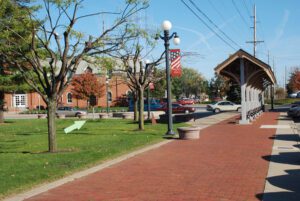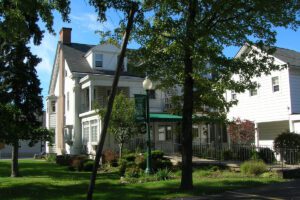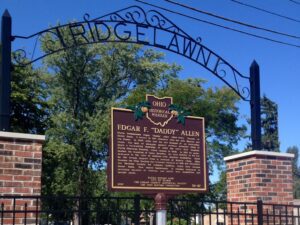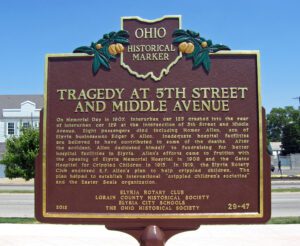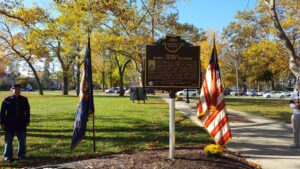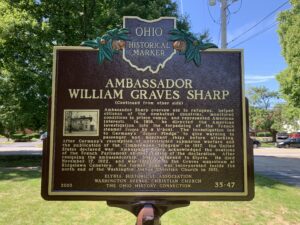, OH
King Solomon Lodge, the first Masonic Lodge in Lorain County, was chartered on December 11, 1821, with Heman Ely as Worshipful Master. Ely (1775-1852), a prominent land developer, founded the City of Elyria in 1817, and built the first grist and saw mills and frame house in the village. Through his efforts, Elyria became the county seat in 1823.
, OH
Sherwood Anderson (1876-1941), author of 27 works, gave up a successful business career in Elyria, Ohio, to concentrate on writing. Born in Camden, Anderson spent his formative years (1884-1895) in Clyde, and in 1919 he published his most notable book, Winesburg, Ohio. Clyde and small-town Ohio inspired many of its tales. Critics also praised his short story collections, including The Triumph of the Egg (1921) and Death in the Woods (1933). Commercially successful as a writer, Anderson moved to rural Virginia, where in 1927 he purchased and operated two newspapers while continuing his literary career. Through his writings and encouragement he was a major influence to a younger generation of writers, including William Faulkner, Ernest Hemingway, and John Steinbeck. Sherwood Anderson is buried in Marion, Virginia.
, OH
Monteith Hall was built in 1835 as the residence of Reverend John Monteith (1788-1868) and family. Before coming to Elyria as the first superintendent of the new high school, Rev. Monteith was an educator and minister in Detroit, Michigan. He was instrumental in founding the University of Michigan, originally located in Detroit, and became its first president. William Gates, Rev. Monteith’s grandson, enlarged Monteith Hall in 1897. Monteith Hall was a station on the Underground Railroad on the route that extended from Oberlin. A tunnel, which ran from the basement of the home to the Black River, was used to help slaves escape to the shore of Lake Erie. Rev. Monteith managed the network on the southern shore of Lake Erie, and aided fugitive slaves in boarding ships to cross the lake to Canada.
, OH
Elyria businessman Edgar “Daddy” Allen (1862 — 1937), founder of Easter Seals, is buried in this cemetery with his wife Blanche and son Homer. In 1907 Allen lost his son because of an interurban crash. The lack of adequate medical services prompted Allen to begin a fundraising campaign to build the city’s first hospital, Elyria Memorial Hospital, which opened in 1908. In 1915 he spearheaded the founding of Gates Hospital, the first facility in the U.S. dedicated to the care of children with physical disabilities. Aided by the strong support from a network of Rotary Clubs, Allen founded the Ohio Society for Crippled Children in 1919 and thereafter the National Society for Crippled Children, which later became Easter Seals. Now named Easterseals, it remains dedicated to providing services to children and adults with disabilities and special needs.
, OH
On April 19, 1891, a head-on collision between two trains of the Lake Shore and Michigan Southern Railway Company occurred at the Kipton depot. Eight people lost their lives, and the depot was heavily damaged. The crash occurred when a fast mail train heading east near Kipton and a passenger train going west from Elyria collided. The passenger train was supposed to let the mail train go by, but the conductor had not realized that his watch had stopped for four minutes and then restarted. As a result the passenger train was late getting to the stopping point. Looking into the matter, the railway company enlisted Webb C. Ball, a well-known Cleveland jeweler, to investigate time and watch conditions throughout its lines. Ball instituted the current railroad industry’s timekeeping program, which specified watches trainmen could use. His attention to accuracy and promptness led to the well-known saying, “Get on the Ball.”
, OH
On Memorial Day in 1907, interurban car 123 crashed into the rear of interurban car 129 at the intersection of 5th Street and Middle Avenue. Eight passengers died including Homer Allen, son of Elyria businessman Edgar F. Allen. Inadequate hospital facilities are believed to have contributed to some of the deaths. After the accident, Allen dedicated himself to fundraising for better hospital facilities in Elyria. Allen’s efforts came to fruition with the opening of Elyria Memorial Hospital in 1908 and the Gates Hospital for Crippled Children in 1915. In 1919, the Elyria Rotary Club endorsed E.F. Allen’s plan to help crippled children. The plan helped to establish international “crippled children’s societies” and the Easter Seals organization.
, OH
Quincy Adams Gillmore, considered one of the greatest military engineers and artillerists of the Civil War, was born to Quartus Gillmore and Elizabeth Reid Gillmore at this location in 1825. He attended Norwalk Academy and taught high school in Elyria before embarking on a military career. Graduating first in his class at West Point in 1849, he entered the Corps of Engineers. In August 1861, he served in the Union’s Port Royal expedition in South Carolina and later in the reduction of Fort Pulaski, which defended the water approach to Savannah, Georgia. The fort, considered impregnable to artillery, fell to Gillmore’s rifled cannon on April 11, 1862, after a two-day bombardment. His success effectively ended the use of large masonry fortifications. (Continued on other side)
, OH
William Graves Sharp lived at this location before and after his tenure as Ambassador to France during World War I. He was born to George Sharp and Mahala Graves Sharp in Mount Gilead, Ohio, on March 14, 1859. As children, Sharp and his twin brother George moved to Elyria with their mother and grandparents, William and Ephra Graves. An Elyria High School graduate, Sharp earned a law degree from the University of Michigan in 1881. He was a journalist, lawyer, industrialist, and Lorain County Prosecutor. Serving three terms in the U.S. House of Representatives, Sharp introduced the first legislation providing for airmail service. Shortly before the outbreak of World War I, President Woodrow Wilson named Sharp as ambassador to France. He served from December 4, 1914, to April 14, 1919. (Continued on other side)



